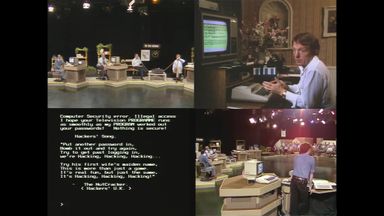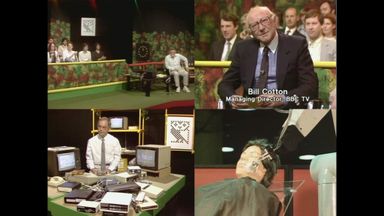MTMOTM Live Special
1. One hour special
Clips from this programme
Mention of the earlier Making the Most of the Micro - Live special where the "OWL001" British Telecom Gold (BTG) mailbox was hacked.
Duration: 01:26Introducing Freff (to be Micro Live's US reporter) showing his home tech, including an Apple II with a 16 bit graphics card, various music kit and a BBC micro.
Duration: 05:09The live studio audience talk about how they use their home micros: for games, coding, word processing and so on and one person (from the US) who does her accounts.
Duration: 01:22John Coll and Mac chat about various ways to connect the micro to the telephone system using a range of acoustic couplers and other modems - some illegal. They discuss Prestel, Compunet. BTG and various bulletin boards.
Duration: 05:39Freff in New York can't make his BBC micro modem work. Live on the phone from New York he sends some code via BTG. John downloads it, then tries to run it; but there's an error. Corrected, the programme then runs: it's an animation called "Some Bytes From The Big Apple".
Duration: 03:42A reprise of the famous hack from the previous Live Special. Hackers explain why hacking is fun and a security consultant explains what's most vulnerable to hacking and how easy it is to guess passwords. One hacker explains being asked to contact one of the companies concerned (Debenhams) to help them improve their security.
Duration: 15:49A lively discussion about computer security and what companies (including Debenhams and British Telecom Gold) are doing to prevent hacking. What is legal and what is not? The audience seem to approve of hacking and the legality or otherwise is uncertain - it's up to companies to protect themselves.
Duration: 03:54Software consultant Ian Trackman explains the advantages and disadvantages of "BASICODE": an attempt to create a version of the coding language BASIC that will work on any machine. For anything complex it's pretty disappointing.
Duration: 04:25Freff interviews Loretta Jones, a New York based artist and illustrator, who uses computers to create her work both for print and for on screen animation. Freff asks her: are computers more for men than women?
Duration: 06:33Mac introduces the results of the software competition run in conjunction with MEP (the Micro-electronics Education Programme). The 15 regional winners are in the studio to hear the results - with applications from school timetabling to a calorie checker for school dinners and printing sheet music.
Duration: 11:46The winners are announced by Bill Cotton, the Managing Director of BBC Television: a technical drawing package, school timetabling software and a music score writing programme.
Duration: 01:04As Chairman of BBC Enterprises Bill Cotton justifies the BBC's Computer initiative. Bill is very supportive and explains that the BBC Micro was created so that the BBC could make TV programmes around it. A valuable side effect has been earning £5-6M in licencing fees, ploughed back into BBC output.
Duration: 01:16Richard Fothergill from MEP explains that the most of the competition entries were written on either the BBC Micro or the RML computer, the two main microcomputers used in schools. Mac asks for ideas for items for the new series Micro Live, and says goodbye.
Duration: 00:47MTMOTM Live Special - Series 1
1. Two hour special
First broadcast: 2nd October 1983
Duration 01:54:46
In a live edition of Making the Most of the Micro, Ian McNaught-Davis is joined in the studio by an audience of micro users and a team of experts. There are demonstrations of hardware and software, including a live download of a program from the BBC's new Telesoftware service, and a look at how the micro can be used to subtitle home videos. Dave Ellis makes micros make music, John Coll demonstrates an electronic mail service, and three teams of programmers, working on different micros, write software against the clock. And a national software competition is launched by the Minister for Information Technology, Kenneth Baker. Whether you are expert or novice, you can take part in the programme by joining in the phone-in, and putting questions or comments to the experts. Producer DAVID ALLEN Director PATRICK TITLEY
MTMOTM Live Special - Series 2
1. One hour special
First broadcast: 24th June 1984
Duration 01:00:12
Ian McNaught-Davis risks the failure of both hardware and software as he introduces the second live programme of items about the world of microcomputers-among them: the computer 'hackers'-who are they? BBC Radio's Basicode explained; American reporter Freff attempts to send a computer program live from New York and also delves into the world of computer-generated art as he meets graphics artist Loretta Jones. Plus the announcement of the winners of the BBC's National Schools Software Competition - with 930,000 worth of prizes - which was launched in the first Micro Live last October. Technical adviser STEVE LOWRY Assistant producer TERRY MARSH Studio director PATRICK TITLEY Producer DAVID ALLEN
Now playing
















